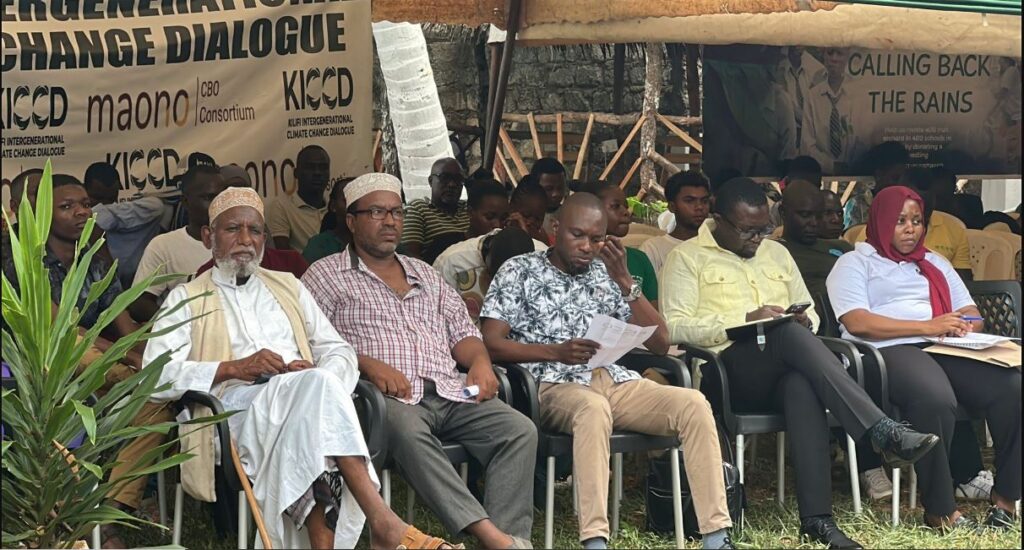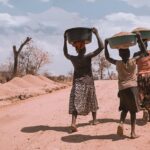
On 15th November 2024, Kilifi Intergenerational Climate Change Dialogue (KICCD02) brought together diverse stakeholders from various generations to engage in discussions focused on addressing climate change challenges and fostering sustainable solutions, in the Kilifi region, Kenya.
The session commenced with an opening remark from Mr. Kanundu Ngumbao, the Director of Climate Change who officially launched the dialogue. Mr. Kanundu highlighted the importance of intergenerational collaboration in combating climate change, noting that both the older and younger generations must work together to develop innovative solutions that are sustainable and inclusive.
He highlighted that the government is committed to supporting local communities in their efforts to adapt to and mitigate the effects of climate change. Mr. Kanundu’s address set the tone for the day’s discussions, underscoring the urgency of climate action and the need for collaborative efforts at the local, national, and global levels.

The dialogue’s first session, titled ‘Climate Change’, focused on the importance of waste management as a key component in the fight against climate change. Emmanuel Baraka, the session’s moderator, introduced the topic by emphasizing how waste management directly impacts climate change, from plastic pollution to greenhouse gas emissions.
Moderated by Emmanuel Baraka (TUZA), along with the panel featured experts and activists, the session was interactive, with participants raising questions and suggesting strategies to improve waste management in their respective areas. The panelists agreed that strong community engagement, education, and policy enforcement are critical to effective waste management.
Elphic Tossi, the panelist from One Million Trees for Kilifi, discussed the organization’s ongoing efforts to reduce waste through tree planting initiatives, as trees are vital in combating environmental degradation and reducing carbon emissions.
Julian Wahome (Kwetu Yetu) shared the innovative waste recycling initiatives being implemented by Kwetu Yetu, particularly their work in empowering communities to turn waste into resources through recycling programs.
Roseline Ngalla (Chairlady, Maono Committee / SHELLA Environmental Youth) spoke about the role of youth in promoting waste reduction and the impact of community-led campaigns in Shella, where young people are actively engaged in raising awareness about waste management practices.
Effue Opiyo (PWAM) highlighted the importance of sustainable waste management practices in reducing environmental harm and emphasized the need for community participation in effective waste disposal and recycling systems.
The second session, Climate Governance, dug into the concept of climate governance, exploring how policy frameworks, regulations, and community involvement can help address the impacts of climate change.
Robert Banda led the session with a focus on the need for inclusive governance that integrates local communities, government agencies, and civil society organizations. He emphasized the importance of decentralized climate governance, where local communities have a voice in decision-making processes.
The panel discussed how Kilifi’s climate governance can be strengthened by improving coordination between local authorities and the communities most affected by climate change. Participants shared their experiences of working with local governments and offered recommendations for improving policies related to climate adaptation and resilience.
The session also highlighted the role of traditional knowledge in climate governance, where elders and community leaders contribute valuable insights based on years of local experience.
The last session, Climate Mobility, explored the issue of climate mobility, focusing on how climate change is affecting migration patterns and displacing communities. Angel Kyalo led the discussion, which examined the movement of people due to environmental stressors such as drought, flooding, and land degradation.
Angel spoke about the challenges faced by climate migrants, including the lack of legal protection, social integration, and access to resources. The session highlighted the need for policies that address the rights and needs of climate migrants while ensuring that communities have the resilience to cope with environmental changes.
The panel also discussed the intersection of climate mobility with urban planning and the importance of preparing both rural and urban areas to accommodate displaced populations in a way that ensures dignity and human rights.
The 2024 Kilifi Intergenerational Climate Change Dialogue aimed to localize climate action by uniting local stakeholders and community members of all ages to discuss the vulnerabilities stemming from current climate changes.

While top-down initiatives from multinational events, including the UN General Assembly (UNGA) and the Conference of Parties (COP), have spurred various climate change mitigation strategies, the Kilifi Intergenerational Climate Change Dialogue organizers says it is crucial to include local communities in the dialogue.
Having concluded the event, Kilifi Intergenerational Climate Change Dialogue (KICCD02), Omina Jewel, the Public relation and Communication manager for ‘One Million Trees 4 Kilifi, Cherishes the outcomes, as she highlights the following:
1. Community Engagement: The importance of community involvement in climate action was reinforced, with a strong emphasis on local solutions and initiatives that leverage traditional knowledge and modern practices.
2. Collaboration: There was a call for stronger partnerships between the government, civil society, and community organizations to drive climate adaptation and mitigation efforts.
3. Youth Participation: Youth were identified as key drivers of change, and their active involvement in climate decision-making processes is essential for long-term sustainability.
4. Policy Recommendations: Several policy recommendations were put forward, including the need for stronger waste management regulations and better support systems for climate migrants.
5. Capacity Building: The need for continuous training and capacity-building for both youth and community leaders was stressed, ensuring that they have the skills and resources needed to lead climate action.
Kenya has taken a proactive role on the global stage, exemplified by initiatives such as the African Climate Summit in September 2023, and ambitious efforts like the transition to 100% green energy and the launch of the 15 Billion Trees initiative.
Despite these advancements, the country continues to grapple with resource scarcity and the dire impacts of climate change, including drought and food insecurity.





